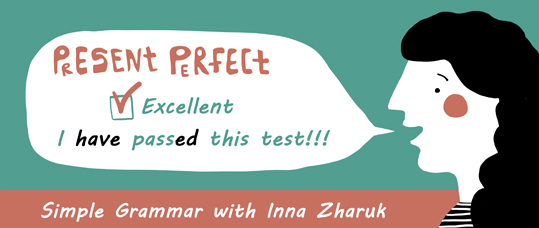Present Perfect - Настоящее завершенное время
It is an interesting and often used tense, so what do we know about it?
Это интересное и часто используемое время, и так, что же мы знаем о нём?
Formation of the Present Perfect
Образование Present Perfect
We form the Present Perfect using have or has + regular verb with ending -ed or irregular verb in the third form in the irregular verbs list.
Мы образуем Present Perfect используя вспомогательные глаголы have или has плюс глагол. Если глагол правильный, то мы добавляем к нему окончание –ed, если глагол неправильный, то мы используем третью колонку из списка неправильных глаголов.
We have listened to the podcast.
Мы прослушали подкаст.
(listen is a regular verb so we add -ed)
(listen - это правильный глагол, поэтому мы добавили окончание -ed)
We have always been very happy together.
Мы всегда были очень счастливы вместе.
(be is an irregular verb be – was/were – been so we use the third form been)
(be неправильный глагол, be – was/were – been, поэтому мы используем третью форму been)
Also, pay attention to using have and has. Has is used with he, she and it while have is used with I, we, you and they.
Также, обратите внимание на использование have and has. Has используется с местоимениями he, she, it, тогда как have используется с местоимениями I , we, you, and they.
He has written a book.
Он написал книгу.
I have written a book.
Я написала книгу.
Now let's listen to the formation of positive, negative sentences and questions in the Present Perfect.
Теперь давайте прослушаем образование утверждений, отрицаний и вопросов в Present Perfect.
He has climbed a mountain.
Он поднялся на гору.
He hasn't climbed a mountain.
Он не поднялся на гору.
Has he climbed a mountain?
Yes, he has or No, he hasn't.
Он поднялся на гору? Да или нет.
They have swum one kilometer.
Они проплыли один километр.
They haven't swum one kilometer.
Они не проплыли один километр.
Have they swum one kilometer?
Yes, they have or No, they haven't.
Они проплыли один километр? Да или нет.
Usage
Использование
There are three main rules to use the Present Perfect.
Существует три основных правила использования Present Perfect.
1. We want to express an action that happened in the past but we don't say a definite time or we don't know it.
1. Мы хотим выразить действие, которое произошло в прошлом, и мы не указываем точное время или не знаем его.
My sister has bought a car. (We don't say when she did it: yesterday, or an hour ago because the exact time isn't important)
Моя сестра купила машину. (Мы не говорим, когда она это сделала: вчера или час назад, потому что точное время не важно)
We have downloaded twenty Android applications. (the specific time is unknown and unimportant)
Мы загрузили двадцать приложений для Андроида. (точное время не известно, да и не важно)
2. We want to talk about a past experience and again we don't specify the time.
Мы хоти рассказать о прошлом опыте и опять же без указания точного времени.
Have you been to Cuba? (We ask about a personal experience)
Вы бывали на Кубе? (Мы спрашиваем о личном опыте)
My mom has never travelled by plane. (No experience is also an experience)
Моя мама никогда не путешествовала самолётом. (Отсутствие опыта - это тоже опыт)
3. We want to list the results. Remember, you cannot mention a specific time.
Мы хотим указать на результат. Помните, вы не можете упомянуть точное время.
Richard has crossed the Atlantic Ocean in an airballoon five times. (His result is five times)
Ричард пересёк Атлантический океан на воздушном шаре пять раз. (Его результат – пять раз)
Stephen has published two hundred books. (Stephen's result is two hundred books)
Стивен опубликовал двести книг. (Результат Стивена - это двести книг)
Time phrases
Фразы указания времени
We use the Present Perfect with the following time phrases: already, just, never and ever, yet, before, this month, etc.
Мы используем Present Perfect со следующими фразами: already уже, just только что, never никогда, ever когда-либо, yet ещё или уже, before ранее, this month в этом месяце, etc и т.д.
Already, just, never and ever. They are used after the auxiliary verbs have and has and before the main verb.
Already уже, just только что, never никогда, и ever когда-либо, используются после вспомогательных глаголов have/has и перед основным глаголом.
I have already had my lunch.
Я уже пообедал.
My friends have just seen Jo.
Мои друзья только что видели Джо.
Has he ever been to Tahiti?
Он когда-нибудь бывал на Таити?
He has never been to Tahiti.
Он никогда не бывал на Таити.
Yet is used at the end of the question or negative sentences.
Yet ещё или уже используется в конце вопросов или отрицаний.
Have you finished your report yet?
Вы уже закончили ваш отчёт?
Before we use at the end of the sentence.
Before ранее мы используем в конце предложения.
I have never met him before.
Я раньше никогда его не встречал.
This week, this month, etc. You can use this phrase at the beginning or the end of the sentence.
This week (на этой неделе), this month (в этом месяце), etc. и т.д. мы используем эти фразы в начале или в конце предложения.
I have started a new job this week.
Я начал новую работу на этой неделе.
I hope the information was useful for you and at last you have understood when and how to use the Present Perfect.
Надеюсь, информация была полезна для вас и наконец-то вы поняли, когда и как использовать Present Perfect.
















